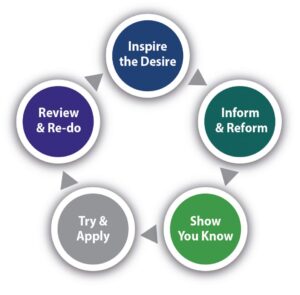How to Develop Confidence for Career Development Conversations

Career development conversations come under that category of conversations we describe as challenging. Why is that? Well, they’re personal, they’re important and they’re full of implied meaning and promise.
For all those reasons, there is a risk that managers won’t have them in spite of their benefits. So how can you help managers develop the confidence to have those important conversations? In this post, I’ll outline 5 steps illustrated by a recent project we’ve completed for a client.
Client Project
The client contacted us for support with their Talent Development programme. Young professionals on the Programme complete assignments focussed on sustainable development. Through their assignments, they gain skills and experience in an international, multi-cultural setting.
The Progrmme is managed and administered by a central service centre. One of the key roles of the Service Centre is to provide career support to the young professionals. The level of experience with career support varied among the team. The client wanted to build capacity among the Service Centre HR staff to provide consistent, coherent career development conversations. We agreed that we would deliver a one day skills-building workshop to enhance their skills.
Confidence and Career Development Conversations
Confidence only comes AFTER people take action. So, the focus of all our development programmes is to encourage people to take action. We want them to try out new behaviours and repeat them until they become embedded in their day to day work.
Five Steps to Develop Confidence
This is how we applied our five step Embed model to develop the confidence to have career development conversations.

Step 1 – Inspire the Desire
The starting point for all development is helping people see the benefit of changing their behaviour. It’s what’s referred to as the ‘What’s in it for me?’ factor. We did this in two ways. Before the workshop, we spoke to some of the HR staff and asked them to reflect on what was and was not working. We also asked them what they thought would help them have better career development conversations. The main themes were:
-
They wanted to build their confidence
-
They wanted clarity on their role so they could manage expectations
-
They wanted support with managing the conflict between what the young professional might want and what the organisation could offer
-
They wanted some practical tools
-
They wanted to engage and empower the young professionals to manage their careers
-
But they also couldn’t afford for the conversations to be too long or complex. They wanted an approach that was brief and simple while still being effective
We also spoke to some of the young professionals to find out what they were looking for from career development conversations with the Service Centre. They told us it would be good to have someone who could help them reflect on their career goals and how to achieve them. They also wanted advice on how to best position themselves to create opportunities. And they wanted to know what strategies they could use to manage and develop their career.
At the start of the workshop encouraged participants to identify the benefits of having effective career development conversations. We looked at benefits to them, to the young professionals and to the organisation as a whole. We reinforced that with a discussion around why career development conversations are important.
Step 2 – Inform and Reform
The HR staff of the Service Centre had a real range and mix of experience of career conversations. Early on, we identified what they knew already and what questions each person wanted answered to feel more confident.
This allowed us to tailor the content so we addressed their specific needs and questions. In this workshop, the questions fell under 5 key areas:
-
What is my role in a career conversation? Coach? Mentor? Advisor? Other?
-
How do I structure an effective career conversation?
-
What are good questions to ask?
-
Are there specific tools and techniques I can use?
-
How do I know if it’s been effective?
So those were the areas we focussed on. We covered Your Role in Career Conversations; What Makes a Career Conversation Effective and The Power of Good Questions. Then we introduced the Career Conversation Toolkit and looked at what each tool does, how it works and how to use it to best effect.
One of the greatest sources for development is other people. So we created an interactive environment where participants could generate ideas, exchange different approaches and share experiences.
Step 3 – Show You Know
To build confidence, people need the opportunity to practice new tools and techniques in a safe environment. So, we spent a large part of the workshop having real career conversations. This gave participants the opportunity to rehearse new behaviours while getting feedback from others.
Step 4 – Try and Apply
The proof of any development programme is the action taken AFTER the programme. So a key aim of the workshop was to create an environment of accountability and support. We encouraged participants to identify the small steps they would try and apply as a result of the development. And we discussed how they would reflect on the experience and record the results so they could capture their learning.
In this case, we were working with a team so they were able to support each other. Me and my team are another resource they can turn to for support and accountability.
Step 5 – Review and Redo
We encourage participants to reflect on the career conversations they have to review what went well. Then they can redo those things in future conversations. That allows them to identify small steps they can take to make conversations even better.
The Results
So, what impact did the workshop have? Feedback from participants showed that they developed greater confidence as we wanted.
“This workshop provided simplicity and clarity to a potentially complex area. A toolkit to take away made it pragmatic’
‘I really appreciated the practical tools and the chance to practice using them’
‘This helped me to provide better career support to our staff.’
The client was happy. So, we were happy.
Ready to Build Confidence in Career Conversations Across Your Organisation?
If you’d like to help your managers feel more equipped – and confident – to have effective career development conversations, I’d love to share some practical tools and approaches.
Start by downloading a free chapter of my book Confident Career Conversations. You’ll discover proven strategies, powerful questions, and a simple framework you can start using straight away.